What's curious, if this 'pool' of people with mitochondrial disease (with autism or autistic features) does exist, how is their health? Their mortality rate hasn't been altered, even a little? Even if the argument is made that this 'pool' of people would have a less severe form of mitochondrial, it would generally accepted that a person with mild mitochondrial disease would still be at a greater risk of associated diseases, raising the mortality rate.
A study done by Baylor College of Medicine, Texas Children's Hospital, State University of New York, Georgetown University, and Stanford University concluded this:
Patients with cardiomyopathy had an 18% survival rate at 16 years of age. Patients with neuromuscular features but no cardiomyopathy had a 95% survival at the same age. Conclusions. This study gives strong support to the view that in patients with RC defects, cardiomyopathy is more common than previously thought and tends to follow a different and more severe clinical course. Although with a greater frequency than previously reported, mitochondrial DNA mutations were found in a minority of patients, emphasizing that most mitochondrial disorders of childhood follow a Mendelian pattern of inheritance.
According to documented studies, the mortality rate amongst autistic individual is 3.4% (about double the expected rate). It must be noted that the deaths were attributed to choking (while unattended), pneumonia, and meningitis for institutionalized individuals. Those living independently or with their parents, one died following an epileptic attack, two others were from drug overdoses.
Another study, the largest ever done on autism and mortality, also concluded the mortality rate to be about double that of the general population. One could possibly draw the conclusion that the individuals who died while institutionalized, might have had a mitochondrial disorder. Perhaps that is why there were at risk and subsequently died from lung and breathing issues. That would still be a very small percentage--roughly 1.7%--of autistic people who might have an underlying mitochondrial disease. That is a fairly baseless conclusion, though, given that the same study concluded that individuals with more severe mental retardation had a three-fold increase in deaths from all causes (except cancer). So, no one is to say whether those 4 people died simply as a result of poor care or treatment in an institution or by an undiagnosed mitochondrial disease. There are too many variables. Either way, we are still looking at a relatively low rate of mortality, as opposed to the rate for individauls with mitochondrial disease (as high as 10-50%, depending on diagnosis, see below).
If 10-20% of autistic children (2,667-5,333), were to have mitochondrial disease, how is it that their mortality is absolutely unaffected. Apparently all have milder forms of mito? That none of them have died as a result of their mitochondrial disease? What is the hospitalization rate for autistic children? What is the same rate for children with mitochondrial disease (even mildly affected)?
We can see a trend from this study done by
Mitochondrial disease followed an episodic course, with periods of stasis or slow developmental progress, punctuated by neurodegenerative events in 18 (60%) of 30 patients. Intercurrent infection was recognized as a precipitant of neurodegenerative events in 13 (72%) of 18 patients with a history of episodic degeneration.
Conclusions Children and adults with mitochondrial disorders are at high risk for hearing loss and life-threatening complications of intercurrent infections. A constellation of audiologic abnormalities, multiorgan system involvement, and history of neuromuscular setbacks with infection strongly suggests mitochondrial disease. Knowledge of these features can lead to more rapid diagnosis and improved medical and surgical management for this special group of patients with fundamental defects in bioenergy metabolism.
I've yet to read about all these autistic children who have lost their hearing or have life-threatening, recurrent infections. So, we are to assume that every single child currently diagnosed with autism but who really has mito, somehow continually dodges the typical symptoms and health issues clearly marked by mitochondrial disease?
Is this worth studying? Yes. Scientists have done some preliminary studies, and they all conclude that further investigations are warranted. I don't think anyone is denying that a small percentage of children currently diagnosed with autism may eventually be diagnosed with mitochondrial disease. But, we must use caution and be careful when people begin to inflate those numbers, and misquote study findings.
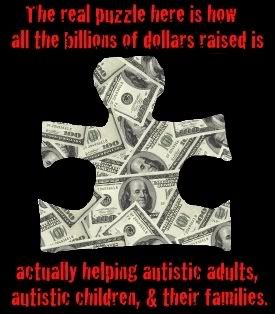







 This Way of Life
This Way of Life

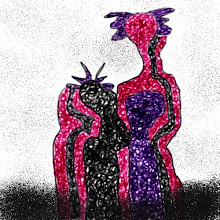

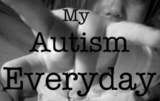





 "Autism is a way of being. It is pervasive; it colors every experience, every sensation, perception, thought, emotion, and encounter, every aspect of existence. It is not possible to separate the autism from the person."
- Jim Sinclair
"Autism is a way of being. It is pervasive; it colors every experience, every sensation, perception, thought, emotion, and encounter, every aspect of existence. It is not possible to separate the autism from the person."
- Jim Sinclair







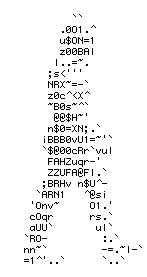

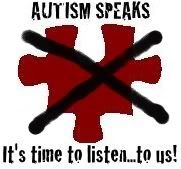












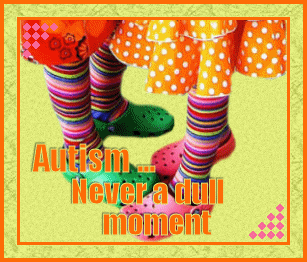

10 comments:
Excellent observations, SL.
Somehow, the argument that "One child was identified with mito disease and autistic symptoms, that means that most autistics also have undiagnosed mito disease and deserve compensation" rings hollow.
Joe
This case highlights a need for greater awareness about mitochondrial disease. What many people do not know is that mitochondrial disease presents in a VERY broad spectrum, and affects people very differently. In addition, there are many adults who are diagnosed with the disease in their adulthood, after either having a child who is diagnosed with the disease, or after experiencing a sudden or gradual onset of symptoms. MITO is not well documented in the literature because the disease is poorly understood and very complex. AT LEAST 30% of patients with ASD have mitochondrial function abnormalities. Many children with MITO "look" normal or have features of ASD. www.blog.MitoAction.org
Cristy
Executive Director, MitoAction
Joe: Thanks. That's the shame of it, I think the intentions here are to get the mito dx, and then get compensated in vaccine court.
Cristy:
"AT LEAST 30% of patients with ASD have mitochondrial function abnormalities."
The 30%, as you know, has to do with "mitochondrial function abnormalities" not mitochondrial disease. My daughter has mitochondrial function abnormalities, yet does NOT have a mitochondrial disease (at least not one yet identified, we see Dr. Shoffner). Kirby is promoting the idea that thousands of autistic children have mitochondrial disease.
I know that people with mito can appear "normal" and that it is a "spectrum" disease, people can be affected in a myriad of ways. The concern here is that autistic children (who have NO disease) will be submitted to painful testing, all because of improper reporting by Kirby and others. That is sinful. As I've stated, I do not think that no autistic children have mito. In all my writings, I recommend genetic testing, and if warranted, mito testing as well for kids on the spectrum. There certainly will be a group of children who present with features of autism, along with other health issues, that will be diagnosed with mitochondrial disease (with autistic features). To create such a storm over the issue, and make dozens, if not hundreds or thousands, of parents want to rush out and see a mito expert (when their child is solely autistic), is unfortunate.
I agree, more awareness needs to be out there for mito disease. However, it should be awareness, not frenzy. Kirby & the like are creating hysteria. This will do nothing to raise much-needed funds for mito research. I have been touched by mito, I have seen friends lose their children to it. I know its affects. I have never donated to an autism charity, but I do make donations to several mito charities.
May I ask: what was your take on the family discussing mito in very little detail? I wished they'd used the opportunity to get the word out on mito.
Thanks for your comments.
One more thing, the agenda of the anti-vaccine group is a troublesome one, and will not prove to be helpful to the mito community. They will use such a finding, that some people who present with autism may actually have mito (or other underlying disorders), to further their case that vaccines do harm. They'll continue to dismiss any genetic link for autism, and many will assume one thing:
People with autism had their mitochondria damaged by vaccines.
They will keep the battle and the focus on autism and vaccines--not mito. They will continue to speak down about autistics and blame shots for "making" their child "this" way. Their argument that vaccines are "poison" will continue, and many more children will go without vaccines, putting the general public at risk for various breakouts and deaths from those diseases.
Great point. Larry King missed the point during his segment on CNN Larry King live. The subject was the autism-vaccine debate, and included a "exclusive" interview with the Poling family. I was disturbed that the obvious issue wasn't addressed by any of the pediatricians and physicians who were consulted.
As a parent of a child with mitochondrial disease, I am well aware that stress, fever, or any demonstrable energy demand could trigger a metabolic crisis for my daughter. In fact, we, after lengthy discussion, decided with our pediatrician NOT to administer the MMR vaccine to our daughter because of the risk. In addition, I insisted that the other vaccines were given separately (commonly children are given multiple injections at one well-visit) and withheld the immunizations until my daughter was in optimal health.
The bigger question raised by the evidence from this one case should be centered around the population of children UNDIAGNOSED with an underlying mitochondrial disease that could manifest as a result of environmental factors, toxins, or physiological stress.
Any mito specialist would agree that the incidence is much higher in our population than we recognize by the statistics/data, and that it is the very unique clinical presentation of mito that makes it so challenging to classify.
But then, I guess the same could be said of autism?! The Mito community hopes to be where the autism community is now in the next five years. I agree that creating hysteria won't get us there, but I also believe that the parents are the greatest advocates for these groups. At some point, our voices will be heard.
Cristy Balcells
www.MitoAction.org
Autism and mitochondrial disease are the same thing, and both are caused by congenital or acquired physiological breakdown due to nutritional deficiencies. Extensive long-term supplementation of magnesium glycinate and B vitamins will "cure" autistic children and adults alike. Try it out with your children and you will see. Autism is a social construct and a mysterious semantic label for something that is more easily explained in the conventional language of nutrition and biochemistry. Calling it "autism" literally makes it seem more catastrophic and impossible to treat. But nutritional deficiencies are much more simple to understand and they can be easily treated with supplements and dietary changes.
I like this information but autism and Mitochondrial Disease are related? and I want to know the side effects of Generic Viagra
It won't work in actual fact, that is exactly what I suppose.
Hey, there's so much useful material above!
mitochondrial disease? do they mean zits, swollen lymph nodes, and excess waxy deposit in the ears? no kidding, those are my symptoms
Post a Comment